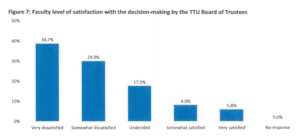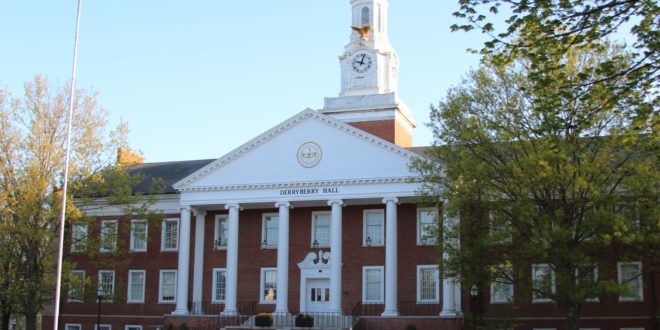A recent survey of Tennessee Tech professors reveals what one faculty member calls “anxiety” towards the school’s administration and Board of Trustees.
Professor Dan Allcott is the American Association of University Professors (AAUP) Chapter President at TTU. He said he survey, which garnered 137 responses, indicates that faculty are uneasy with the school’s administration.
“There is a level of anxiety on campus about the disconnect between what professors feel about the direction our university is going in,” Allcott said, “and what the administration feels or how it reports, and how our Board of Trustees is responding to it.”
Allcott said the purpose of the survey was to gauge the atmosphere among Tennessee Tech’s professors in regards to the school’s administration and Board of Trustees.
“Every year [the] administration makes available and does a survey of faculty for the administration,” Allcott said. “Those results are not shared with us. Those are for job performance reviews, so this basically does the same thing. It gives us to see where the strengths and weaknesses are as we are moving forward together in our University.”
Nearly 69 percent of the faculty members that responded said they were dissatisfied with the Board of Trustees’ decision making. Almost 80 percent said they were not confident in the way President Phil Oldham or the administration have upheld their responsibilities.

Nearly 69 percent of TTU professors surveyed said they do not agree with the Board of Trustees’ decision making (Source: TTU AAUP Survey Results)
Allcott said he wasn’t surprised by the results of the survey based on the events of the past year, including the research misconduct charge regarding the Fitzgerald Glider Kits study.
“Last year was a tough year. The faculty senate had to basically work really hard to counter some negative press that we received nationally,” Allcott said. “I think the mood was there was a lot of anxiety about that and why a research project was removed from the investigating professor. There was just a lot of anxiety over how we were proceeding with that.”
Allcott said one of the top priorities that Tennessee Tech needs to address is the issue of shared governance on campus. Just under 75 percent of survey responses indicated they were at least somewhat dissatisfied with the amount of shared governance between the administration and the faculty.
“When good information is used and solicited from a broad group of people across campus, we feel the university can make better decisions,” Allcott said. “So in this previous case where we had a research issue where the most important people were not being used for the research, that’s what I call a ‘chosen voices’ approach rather than [using] the right voices.”
Allcott said listening to and better understanding the needs of faculty members will ultimately help Tennessee Tech in the long run.
“There are a lot of people with expertise on our campus and their information needs to be used in making decisions,” Allcott said. “we all want to help but we have to feel free to share information. So if you feel like ‘I’m a dissenting voice, I shouldn’t talk or I’ll get in trouble or I might be under a threat,’ then the university is not getting all of the information they need to make good decisions.”
The survey was administered to 421 full-time faculty members by Tennessee Tech’s AAUP chapter with a response rate of just under 33 percent. Of the 137 respondents included 98 tenured professors and 22 tenure-track professors. A full list of the survey results can be found on the AAUP’s web portal by visiting sites.tntech.edu/aaup.
 News Talk 94.1/AM 1600 Where The Upper Cumberland Talks
News Talk 94.1/AM 1600 Where The Upper Cumberland Talks








